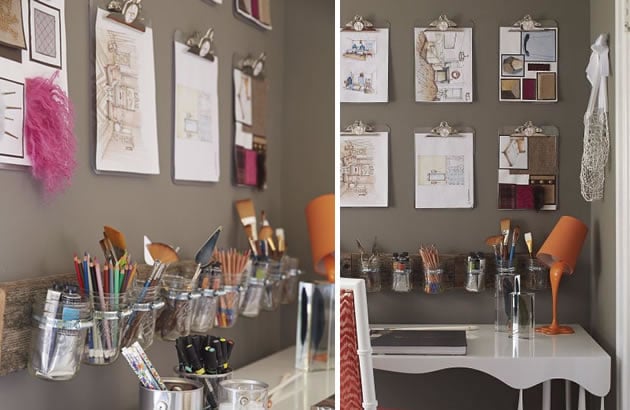Last Updated on December 11, 2024
People often think that high-achieving Art or Design students are blessed with a gift: bestowed with a creative talent since birth. You might be surprised to learn that those who excel in high school Art often excel in a wide range of other subjects too – that it is not so much a creative gift that they possess, but rather a practical understanding of how to succeed. Every day thousands of skilful Art students underachieve, while others slowly and steadily inch their achievement levels higher and higher.

Those who succeed in Art – as in other areas of life – do so because they hold beliefs that lead them to act in certain ways and engage in daily rituals and routines that have a tremendous positive cumulative effect over time. The good news is that these things can be practised and applied, regardless of your current skill level or expertise. The 16 steps below – if acted upon consistently – may improve your performance in all high school subjects and trigger an upcycle of positive change that spills over into the rest of your life.
1. Dream of success
Most people spend their days fretting about the past or worrying about the future. They carry around an inner critic that belittles their skill, intellect, appearance, decisions, actions and worth as a person. The human capacity for anticipating the future based on the events of the past has resulted in us dominating the planet; it is also the leading of cause of misery. If you are depressed, worried or anxious, read The Power of Now by Eckhart Tolle (Amazon affiliate link). He will remind you that what has already happened has gone and will only ever exist as a memory experienced in your mind now. Similarly, the future is an imaginary concept that can only be considered in this moment: now.
Worry shackles you. It leaves you paralysed with fear. Instead of contemplating negative outcomes – transform your inner critic into an advocate. Treat yourself with the wisdom and kindness that you would show a child, sibling or friend. Imagine an outcome so awesome that your parents, teachers and friends are filled with pride. When you realise that achieving something great is entirely possible, every facet of your brain begins to work together and your feet begin to move towards this goal.
Whether you think you can or you think you can’t, you’re right. – Henry Ford
The mind is everything. What you think you become. – Buddha
It is never too late to be what you might have been. – George Eliot
Whatever the mind of man can conceive and believe, it can achieve. – Napoleon Hill
2. Get enough sleep
80% of the teenage population is estimated to be suffering from a lack of sleep according to a 2006 poll by the American National Sleep Foundation. Even worse, we don’t know it. As sleep deprivation increases, the body adjusts in order to cope and we don’t register the feeling of tiredness – especially if we try to stimulate alertness with caffeine, junk food, artificial lights or digital screens. Average sleep hours are estimated to have decreased by two hours per night over the last fifty years; primarily the direct result of electronic devices disrupting our circadian rhythm – the natural cycles that prompt us to wake and sleep.
Chronic sleep deprivation causes a dramatic reduction in performance in just about all areas of life. An article published by The Indiana University School of Medicine titled Neurocognitive Consequences of Sleep Deprivation, by authors Jeffrey S. Durmer and David F. Dinges states that:
…profound neurocognitive deficits accumulate over time in the face of subjective adaptation to the sensation of sleepiness.
In other words, the longer we suffer from sleep deprivation, the worse our brain becomes, but we don’t realise this.
…the mean functional level of any sleep-deprived individual is estimated to be comparable to the 9th percentile of non–sleep-deprived subjects.
In the Beginner Guide to Overcoming Sleep Deprivation James Clear explains that:
…if you get 6 hours of sleep per night for two weeks straight, your mental and physical performance declines to the same level as if you had stayed awake for 48 hours straight.
Sleep deprivation – even mild sleep deprivation – reduces your performance, alertness, memory, ability to retain and process information and affects motivation and mood. It makes you slower, less efficient – and worse at making decisions. If you think that you can even remotely perform to your potential in a high school Art subject (let alone anything else) while gaining insufficient sleep, you are mistaken. Stop texting, Facebooking, chatting online and surfing the net at night. Get a free blue-light blocker app on your cell phone and use it after darkness falls. At bedtime, turn off all lights and electronic devices (don’t sleep with these near you) and sleep in total darkness.
Prioritise sleep, for your own sake. Make it a challenge, and measure the effect it has on your Art projects and your life.
3. Eat well (and stop dieting)
Like the rest of the world, teenagers are image and health conscious. This often leads to restrictive dieting, excessive hunger and other ongoing eating issues such as anorexia, bulimia and binge eating disorder (conditions estimated to be rampant in modern society).
Recent Canadian data demonstrate that nearly one-half of Ontario teenagers attending public school feel unhappy about their weight…[]… It is not surprising, therefore, that strategies aimed at changing one’s weight and shape are also extremely prevalent. Canadian cross-sectional data suggest that more than one in five teenage girls are ‘on a diet’ at any given time. American, Australian and British data also suggest similar high rates of attempted weight loss among adolescents. – from a study published by the Canadian Paediatric Society
Dieting has – at best – a 98% failure rate. Restricting calories mutes your brainpower, makes you tired, erodes willpower, and ruins your mood. Eat like a normal person: satisfy your appetite with a combination of nourishing food from all food groups.
To perform your best in any high school subject, your body and brain need to be well fed (you might not believe it, but this is also the way to achieve an optimal physique).
4. Stop poisoning yourself with addictive substances
You might be surprised how many teenagers compromise their high school performance as a direct result of taking drugs or engaging in other harmful behaviours. Many countries have a crazy youth culture that involves experimenting with vaping, alcohol and other addictive substances (those which – by their very definition – offer the fleeting illusion of pleasure in exchange for long term pain). These cause the deterioration of physical health and a depression of your mental state. Very often this is compounded by foggy memories, social embarrassment, regret and a lack of sleep.
If you can’t convince yourself of the detrimental nature of such substances, remind yourself that have the rest of your life to destroy your brain and cripple your productivity. Don’t destroy your chance of getting into a good university and throw your life plan off-course right now. At the very least, save partying for end-of-year vacations, when the damage is less likely to directly impact an assessment of your academic ability that you will have to live with forever.
5. Get some sunshine
Sunshine exposure triggers the development of vitamin D in your skin; helps with bone strength and resistance against diseases. It has been linked to higher levels of serotonin – a neurotransmitter that promotes a good mood and regulates appetite, sleep and memory.
Humans are not designed to be trapped inside, under artificial lights, for hours on end. Kick a ball outside. Lie in the sunshine for 10 minutes and see how this changes your mood, your outlook and your approach.
6. Make your workspace beautiful
Art students often become allured by the notion of beautiful chaos, but, in the context of your workspace, mess usually begets more mess.
Nine in ten (90%) Americans admit that unorganized clutter at home or at work has a negative impact on their life. Their productivity (77%), state of mind (65%), motivation (53%) and happiness (40%) are affected when there is disorder. – from a study by OfficeMax
Organising your room and desk makes you feel accomplished, confident, motivated, relaxed and in control. Studies show that, in most people, tidy work spaces increase work capacity and strengthen willpower. When too many things are present in an environment, we are less able to focus.
A kid’s art studio designed by Tineke Triggs of Artistic Designs for Living:

This doesn’t mean that you need to create a sterile environment, or organise things at the expense of working. Art students benefit from being surrounded by images, materials, artwork and inspiring subject matter. You should also remember that, according to the New York Times, a study by Ajilon Professional Staffing has linked messier desks to higher salaries. You don’t need to be extreme or obsessive, but if the mess has got out of control or your environment doesn’t stimulate creation, a change can be highly beneficial.
You may even consider setting up an unused shed or bedroom as a studio, such as Lexington High School student Seth Ritter:

If your space feels claustrophobic or you are drowning in clutter, read The Life-Changing Magic of Tidying: A simple, effective way to banish clutter forever by Marie Kondo (Amazon affiliate link).
Note: Recruit someone to help you with this step if necessary. Whatever you do, don’t use this as an excuse to put off actually getting your work done.
7. Every day, do the most important thing first
A surprising number of highly successful individuals practise the habit of waking early and doing the most important task of the day first. The first few hours after you awake are deemed to be the most productive, because you are alert and able to summons high levels of focus and willpower. Hal Elrod, author of The Miracle Morning (Amazon affiliate link) shares the notion that a great life is made up of a series of great days…and that the best way to create a great day is to start with a great morning. If you are in the habit of staying up late to work on assignments, try waking up early instead. This will improve your sleep quality and lead to a productive before-school routine (allowing you to get work done at a much faster rate than you did while exhausted at night – even for self diagnosed ‘night owls’). This sets your day up as you intend to continue and primes you for success.
…both success and failure are largely the results of habit! – Napoleon Hill
Either you run the day, or the day runs you. – Jim Rohn
8. Don’t wait for motivation. Get your homework done
Once you have established a regular routine for working on your art, and learned how to paint and draw quickly, you will find that it is possible to steadily complete homework tasks and never get behind. If you have lost control of your Art homework – read how to stop procrastinating and get your Art homework done.

9. Make art about something that matters to you
Interpreting a topic in a way that has relevance and meaning for you – and allows you to tell your own story – can be the difference between muddling along with boredom and disinterest and racing through a project with excitement and joy.
Use first-hand resources. Aim for powerful, emotive artwork, even if the subject matter itself is set by your teacher and describes the most mundane objects you can imagine. Focus on the message and the ideas: express a tiny (or huge) part of your world.
Start where you are. Use what you have. Do what you can. – Arthur Ashe
If you need help coming up with a great topic, read Art Project Ideas: a guide to subject matter selection.
10: Understand every word of the marking criteria
If you don’t understand how your work is assessed, you are fighting blind. Don’t be so naïve as to assume that great work deserves great marks. You might write the most amazing essay in an English Language class, but if this doesn’t answer the question, you will fail. To achieve full marks in Art, you must meet the marking criteria completely. In most cases, this involves a combination of technical skill; competent handling of media; a range of artistic processes and techniques; development of ideas towards well-balanced, resolved compositions (read more about development here); and the expression of personal ideas.
If you don’t understand the terminology that is used within your assessment criteria, ask your Art teacher to explain and keep asking until the meaning is clear.
11. Ask for help
With open ears and willing effort, you become the kind of student that an Art teacher will do anything for. No matter how much of a prickly thorn you have been in the past, your teacher will transform and begin to work with you, when you offer kindness, appreciation and respect.
If you want to lift yourself up, lift up someone else. – Booker T. Washington
Ask your teacher to explain what you have been doing wrong in past assessments. Tell them to focus on the one thing that you can do that will lead to the most gains. When you have mastered this thing, seek further advice and move onto the next thing.
12. Be creative
For goodness sake, do something different. Experiment a little. Use something other than plain white paper. Trial drawing or painting on grounds. Use new techniques: mix, combine and apply mediums in fun and crazy ways. We have written a whole series on use of media for Painting students. Photography students may like to read 100+ creative photography ideas.
You can’t use up creativity. The more you use, the more you have. – Maya Angelou
13. Play to your strengths
Most Art students have areas where they excel and others where they are less confident. In the Top 10 Mistakes Made by Art Students we provide these tips:
If you are messy and struggle to control paint, choose an artist model that allows you to apply gestural, expressive brush strokes, so it appears that your lack of control is intentional (this will allow you to continue practising with wet mediums, rather than avoiding them completely).
If you struggle to draw realistically, read 11 Tips for Creating Excellent Observational Drawings and consider embracing gestural drawing, distortion, manipulation or semi-abstraction.
Showcase your strengths and use these as a distractive mechanism, while confronting your weaknesses head-on.
14. Present your work well
Presentation is the way you ‘sell’ your work to the examiner; it has a direct impact upon the way the work is perceived.
The way artwork is mounted, arranged and put together speaks volumes to the examiner about your attitude as a candidate: your enthusiasm, your commitment and work ethic. Scrunched, dog-eared, smudged works can (if you are lucky) communicate the idea that you are a insane, artistic genius, but they are more likely to communicate the idea that you are a disorganised, slovenly student who couldn’t care less about the subject. When someone has a few minutes to assess or moderate your entire year’s work, first impressions count. – from the Top 10 Mistakes Made by Art Students.
We have an in-depth article about presentation coming soon.
15. Learn from the success of others
In Art, ‘excellence’ sometimes isn’t clear until you see it. Often a marking criteria can be understood in theory, but the difference between mediocre and outstanding is not evident until you have work in front of you. If your Qualification Board publishes standards booklets showing examples of work at different grade boundaries, study these closely.
We have many Featured Art Projects on this website, showcasing excellent work from a high school Art departments around the world. These can be a great way to understand what development means and gain inspiration and motivation for your own project.
16. Take complete responsibility for your success: blame no one else
It is easy to blame parents, siblings, teachers and friends for distracting, disappointing, annoying or disadvantaging you in some way. Whatever your situation is, only you can make the change that is needed to reach success. If you think you have it tough, think of Heather Purdham of Westcliff High School for Girls:

I can’t remember a time when I didn’t enjoy drawing so I knew I just had to learn to adapt. – Heather Purdham quoted in the Daily Mail
What matters is not what happens to you, but how you respond to it. If you change your own attitudes and behaviours, others change the way that they respond to you. If you turn up with positive action, effort and willingness, the world transforms. Don’t believe me? Test this theory.
Everything has beauty, but not everyone can see. – Confucius
If the wind will not serve, take to the oars. – Latin Proverb
Remember that not getting what you want is sometimes a wonderful stroke of luck. – Dalai Lama
I am not a product of my circumstances. I am a product of my decisions. – Stephen Covey
Everything you’ve ever wanted is on the other side of fear. –George Addair
When everything seems to be going against you, remember that the airplane takes off against the wind, not with it. – Henry Ford
This article might seem to contain strange advice for an Art education website; but if you were in my class, I would share this with you: these are the lessons that I wish had known. In Art class, we are lucky: students and teachers get to talk about the stuff of life while we make art with our hands. If you believe the things above, you can create anything that you dream.

